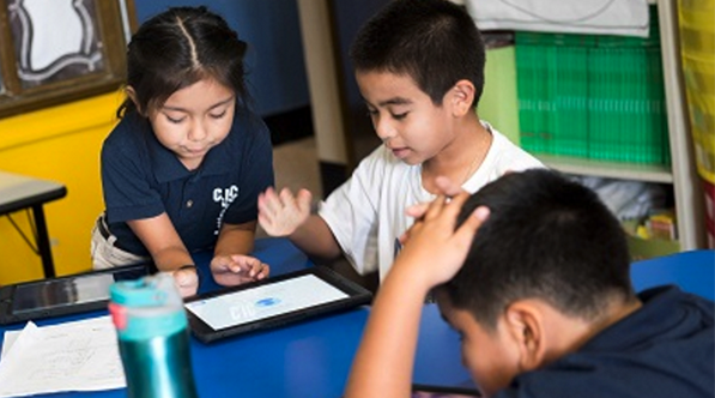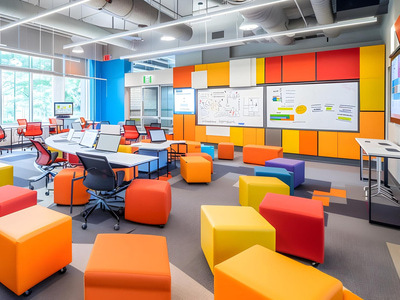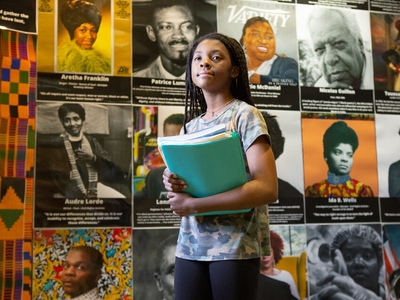New Designs for School
How Competency-based Learning Can Support Student Agency
Topics

We’ve all had the experience of truly purposeful, authentic learning and know how valuable it is. Educators are taking the best of what we know about learning, student support, effective instruction, and interpersonal skill-building to completely reimagine schools so that students experience that kind of purposeful learning all day, every day.
Practitioner's Guide to Next Gen Learning
When students design their own pathway, are free to fail/free to learn, and demonstrate mastery through self-directed assessment, student agency thrives.
Competency-based learning best supports student agency when students design their own pathway, are free to fail (otherwise known as free to learn) on their way to mastery, and demonstrate their learning through self-directed assessment. Participants in a recent #NGLCchat on student agency viewed student voice and ownership as key links between competency-based learning and student agency.
Competency-based learning leads to student agency when it...
Brings educators and students together to think about what they want students to learn, and then builds a system that helps them get there.
Fosters learners who eagerly ask, "What am I going to learn, create, investigate, code, and express today of my own choosing?"
Allows richer social contexts, enabling the development of social capital. We need to examine the difference between a compliance culture and an empowered one in competency-based schools. “Agency allows one to confront the challenges and barriers that are encountered in life, not as fixed limits to what is possible, but as obstacles that can be overcome” (Foundations for Young Adult Success).
Focuses not just on learning experiences but also on developmental experiences, which forces us to “think more closely about those habits, skills, and characteristics that students need for developing agency.” Incubator School shared images of tools they use to help students understand where they are on their way to achieving their goals: “The Starter,” “The Ramper,” “The Boss,” and “The Visionary.” They are also seeking input: what do you need in an entrepreneurship playbook?
Organizes around multi-age groups, like Montessori schools do. Guest expert Dave Lash lamented that grouping by age was the “worst decision in the history of public education” but competency-based education is our way out.
Changes the way we talk and think about failure. Failure equals learning. If we want students to feel empowered by their work, they can’t fear failure. If you get everything right the first time, where is the learning? Competency-based learning that encourages risk-taking and experimenting promotes agency.
Provides opportunities and time for revision, redos, and retakes because students need time to learn, unlearn, and relearn and students don’t all learn at the same pace. When time is no longer an obstacle, students can take ownership.
Gives students support to design their own pathway to graduation, learn at their own pace, and develop their own goals; for example, Building 21 creates student agency through student-created learning pathways, workshops, and internships.
Keeps the focus on learning not grading. When grades are necessary (and they aren’t going away any time soon), grades should instill hope and reflect learning. They should not be influenced by compliance—don’t give zeros for incompletes, turning in something late, or extra credit for completing homework. And don’t grade formative assignments where students are “coming to know” through practice and engagement with new material.
Provides separate and distinct Habits of Work (HOW) grades that reflect work ethic, like at Casco Bay High School in Portland, Maine: “We have second chances and we also have to take responsibility. We can revise if we have a good HOW grade.” In guest expert Casey Montigney’s classroom, at Medill-Shue Middle School in Delaware, students Request to Retest, self-evaluating to do better the second (or third) time.
Teaches students to assess themselves, to maximize learning. How do students know when they have learned? When it’s making an impact, on themselves, others, or their local community and beyond. Leaders of Their Own Learning: Transforming Schools through Student-Engaged Assessment from EL Education is a good resource for implementing agency in assessment.
Employs more authentic assessment. Assessment is authentic when students can see and feel a tangible change in themselves and a contribution to others. When students create metrics around that tangible change.
Emphasizes achieving mastery so students can be the architects of their own academic success. Agency is supported when competency-based learning allows students to demonstrate that mastery in the way they best express what they know. If we aren’t asking students to master material, then why are we teaching it?
Uses tools such as the student-voice rubric from the Student Voice Collaborative and anchor charts from RSU2 in Maine.
Student Agency Always Exists
As we think about ways that competency-based learning supports student agency, I’ll end on this insight from Chris Sturgis at CompetencyWorks in a reflection on the book, Learners Rule:
“Student agency is a natural phenomenon. It exists, and the question becomes whether we nurture it, draw on it, engage with it, or tamp it, even suffocate it, by the layering of rules, compliance and isolated studies. Student agency always exists; the question is, are we engaging with students in productive ways, or in ways that keep all of us from reaching our goals?”
I am grateful to everyone who participated in the Student Agency #NGLCchat for leading us to these insights, including the guest experts:
- Grace Belfiore, Researcher and author, lead developer of MyWays project
- Dave Lash, Researcher and author, lead developer of MyWays project
- Andrew Miller, Consultant with Buck Institute and ASCD
- Casey Montigney, Teacher at Medill-Shue Middle School, member of the Carnegie Foundation’s Student Agency Improvement Community
- Michele Savage, Principal of Medill-Shue Middle School, member of the Carnegie Foundation’s Student Agency Improvement Community
Related Posts
How Next Gen Learning Can Support Student Agency - Ownership. Freedom. Respect. Trust. Courage. Souls on Fire. Find out what student agency is and why it’s so important to education today.
How Project-Based Learning Can Support Student Agency - Authentic learning experiences, reflection, student voice and choice, and connections to community elevate project-based learning by honoring student agency.
How Blended Learning Can Support Student Agency - Blended learning puts students in the driver’s seat of learning by increasing their voice, choice, and motivation.





